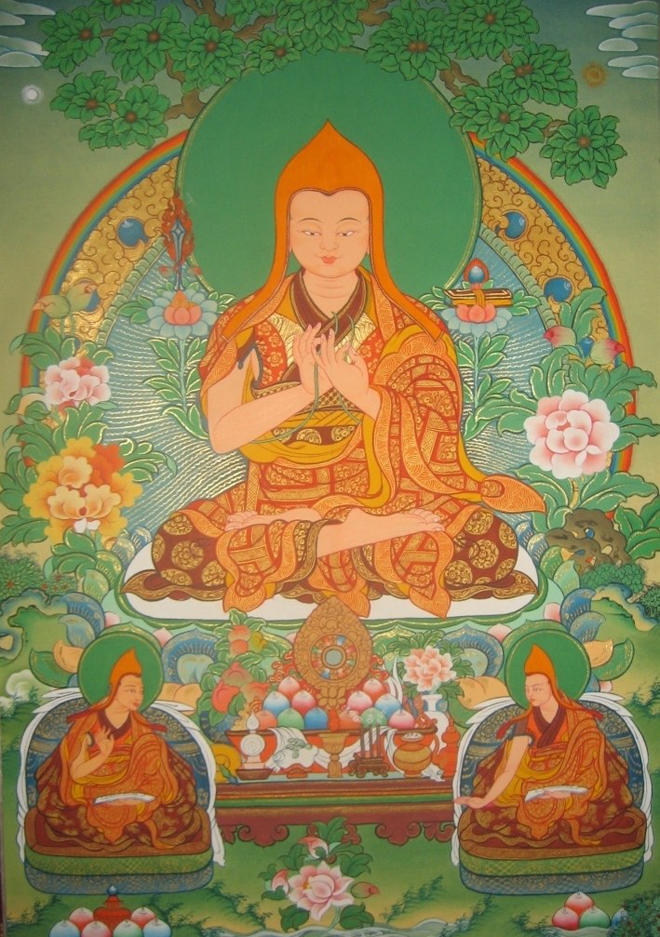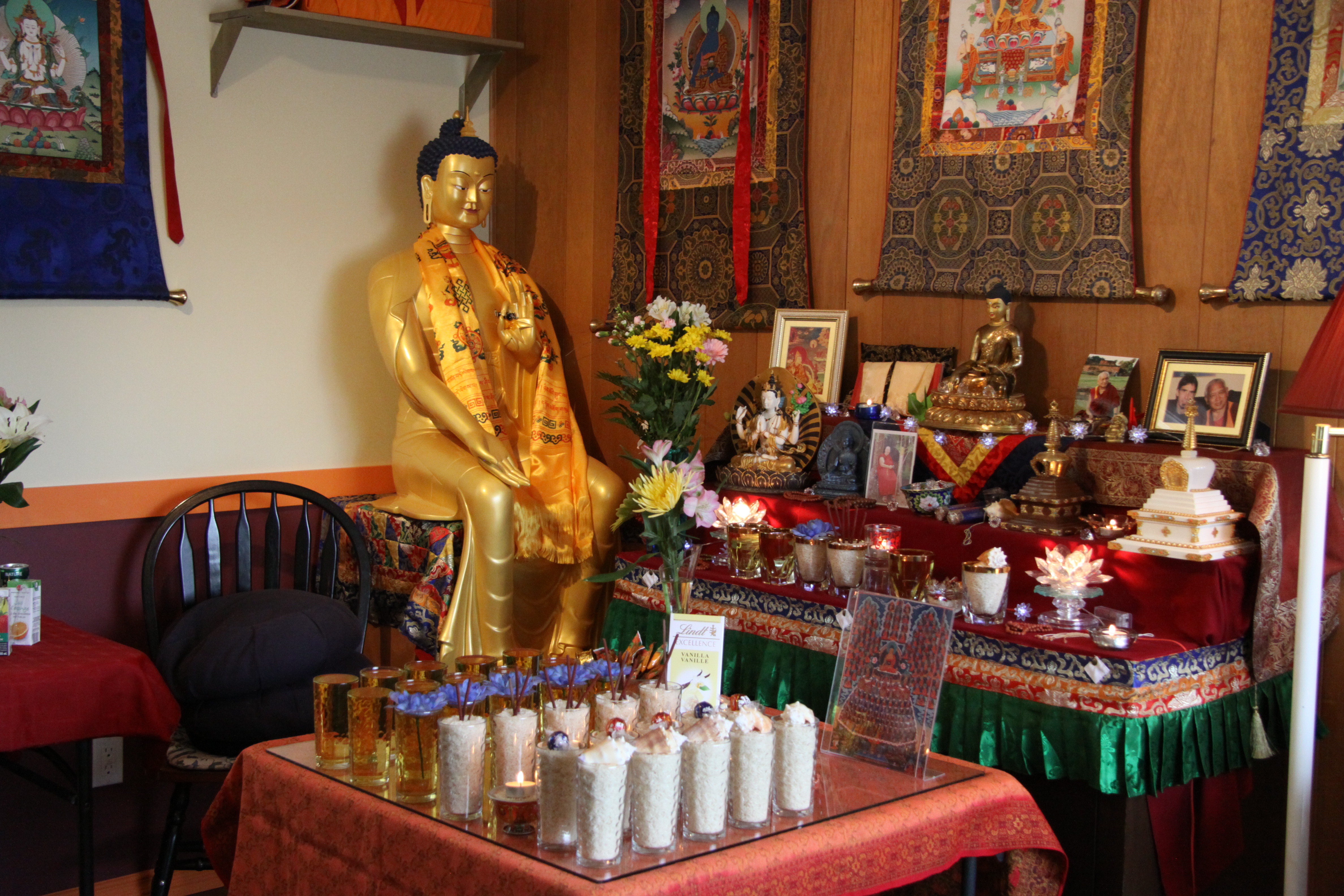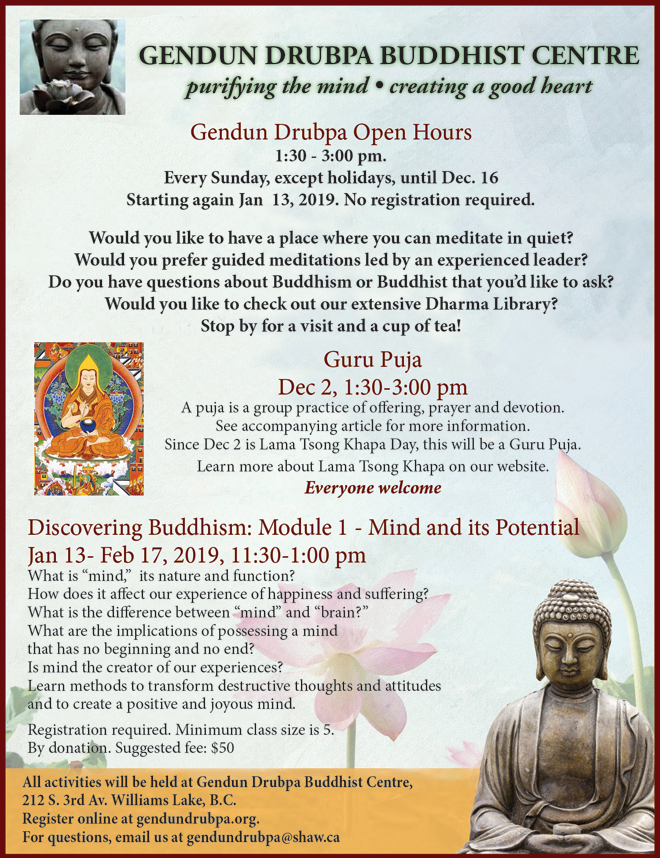By Dianne Noort –
On December 2 from 1:30–3:00 p.m. Gendun Drubpa Buddhist Centre in Williams Lake will offer a puja. We offer various pujas several times a year. Sometimes it is to Medicine Buddha or to Tara. The upcoming puja is a Guru puja.

Puja means “offering” in Sanskrit, and this practice of making offerings can take many forms. We can do them alone or in a group, with or without our teachers. During rituals like pujas we are at our most human. Pujas give us the chance to connect with our big minds and big hearts, even as we are confronted with our impatience, our laziness, our competitive spirit, our jealousy.
Ven. Thubten Dondrub, a Foundation for the Preservation of the Mahayana Tradition (FPMT) teacher, explains, “a puja ceremony involves making offerings of our devotion, faith, and practice and also making actual offerings such as flowers or fruit. We can also do these practices on behalf of other people, or, as is the Tibetan tradition, we can make offerings for the benefit of others who may be experiencing sickness or other problems in their life.”
Ven. Dondrub also says pujas give us a chance to develop devotion to our teachers in a ritualistic, less intellectual way.
How do you explain something like the Guru Puja – with its focus on intense guru devotion – to newcomers? Ven. Tenzin Nangsel of Mahamudra Centre in New Zealand thinks of it this way: “… the ritual side of practice can be very off-putting to beginners if they don’t understand what we’re trying to do with our minds, the visualizations, and the mind-states we’re trying to cultivate in the pujas. I try to draw parallels between what we’re doing in the puja and rituals and [everyday experience we’re already familiar with].
For example, we’re all very familiar with traditional ways of welcoming someone we value highly into our homes. We’d clean and make our home very beautiful. We’d prepare delicious food and drinks and attend to everything we could think of to offer them and bring them pleasure.
It’s the same in a puja. We’re saying welcome, we’re so happy you’ve come. Please would you like something to eat and drink—we’ve prepared this for you. Then we’d settle in for a chat. We tell our guests we’ve been struggling with a few things (our afflictive emotions) and that sometimes we haven’t been so skillful—we’ve harmed ourselves or others and we wish we’d done things differently. Then we happily tell our guests about the times we were able to be kind and loving, and we say we’d like to be able to do it more often. Then we tell them…it would help us if the buddhas could stay and show us how to develop love, compassion, and all the qualities we need to be of real use to other beings.”

The Guru puja will be chanted as a group prayer practice that incorporates all of the most essential teachings of the Buddha. It lays the whole path to enlightenment on our mindstream, connects us more strongly to our teachers, and allows us to quickly and effectively accumulate merit and purify negative karma.
We unite our minds with the holy mind of the Spiritual Teacher, who is considered the root and life-force of the spiritual path, to receive blessings and prepare our mind for realizations on the path to Enlightenment.
December 2 is a special day in our tradition, called Lama Tsong Khapa Day. Lama Je Tsong Khapa (1357-1419) was born in Amdo, in northeast Tibet. It is said that miraculous events occurred at his birth. He is, perhaps, best known for founding the Gelug Tradition, to which His Holiness the Dalai Lama belongs. Based on Tsong Khapa’s teachings, the two distinguishing characteristics of the Gelug tradition are the union of sutra and tantra and the emphasis on vinaya.
Come as an observer or participant in this beneficial practice within a supportive community. You are invited to bring flowers or food offerings for the altar. You may also donate to the puja, online at www.gendundrubpa.org/wish-list. If you care to add names to our prayer list, see www.gendundrubpa.org/pujas-prayers. Gendun Buddhist Centre is affiliated with the Foundation for the Preservation of the Mahayana Tradition (FPMT). For more information see www.fpmt.org.



1 Comment
Have you heard how Ven. Tenzing Gyatso is doing?